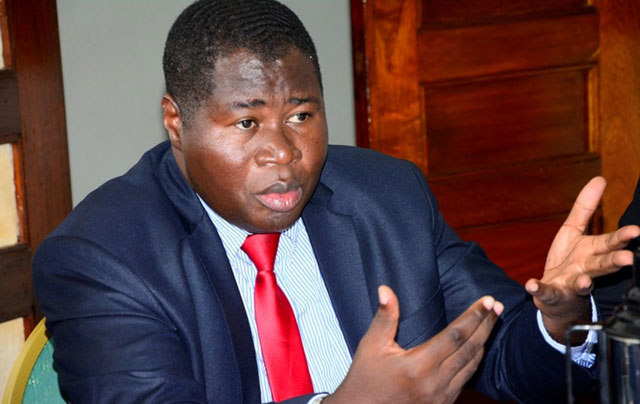
Jacob Oboth, the Legal and Parliamentary Affairs Committee chairperson applauded the move saying that anticipatory declaration of wealth is one of the new types of corruption used by leaders.
Kampala, Uganda | THE INDEPENDENT | Legislators sitting on the Legal and Parliamentary Affairs Committee have expressed support of the government’s proposal to bar public officers from declaring wealth in anticipation.
The Committee today started considering the Leadership Code (Amendment) Bill, 2020 in a meeting were MPs interfaced with the Minister of State for Ethics & Integrity Simon Lokodo and members of the Leadership Code Tribunal.
Under the Leadership Code (Amendment) Bill, government proposes prohibition of anticipatory declaration of wealth as one of the new ways to curb corruption by preventing all public officers and leaders to declare income, assets and liabilities that they expect to receive.
Lokodo said that the new clause is meant to widen the scope of the offence so that public officers do not use anticipatory declaration to cover up corruption tendencies.
Jacob Oboth, the Legal and Parliamentary Affairs Committee chairperson applauded the move by government to include the Clause in the Bill saying that anticipatory declaration of wealth is one of the new types of corruption used by leaders.
“Corrupt officers who make deals in government procurement would anticipate and declare what they don’t have to appear smart,” he said as other committee MPs nodded in approval. “So, if they are anticipating a deal of 100 million, they would say they have it now so that when that deal matures, it would be clean money, saying “…I even declared the other year’! ”
Oboth says that the absence of this provision has been a big gap and the public officers and leaders have been taking advantage to declare assets or income they hope to get through corrupt tendencies.
“The Inspectorate of Government should now be able to verify every declaration and even inspect,” he added. “If you are saying you have 100 million…and all our bank accounts are declared we should be able to know the kinds of assets and liabilities. Other people declare that to purely circumvent the legal process so it is a new form of corruption,”
Oboth says that such a law is in place in Nigeria and that his committee in 2017 made a recommendation to have it incorporated in the Leadership Code legislation.
This and other proposed amendments under the Leadership Code (Amendment) Bill, 2020 are intended to strengthen the enforcement of the Leadership Code Act. Introduced in 1992, the Leadership Code Act that was last amended in 2017 by parliament sets limits on the financial behaviour of public servants, require leaders to declare their incomes, assets and liabilities and put in place enforcement mechanism and other matters.
The other proposals are that a leader shall be taken to have an interest where an income or asset is owned or developed by the leader, jointly owned or developed by the leader with another person, is acquired or developed by the leader for another person and others. The others are when the income or asset is held in trust by the leader for another person or is contained in a joint account for the benefit of the leader and another person.
Also proposed is increasing the period within which the Inspectorate of Government may undertake verification of a declaration from 60 days to 90 days, empower the Leadership Code Tribunal to hear appeals from any person whose application to access a declaration has been rejected by the Inspectorate, extend the jurisdiction of the Leadership Code Tribunal to complaints made by any person aggrieved by a decision of the Inspectorate and others.
In her presentation to the committee, Dr. Roselyn Karugonjo, the Leadership Code Tribunal chairperson appealed to the MPs to approve the Bill so that they can recruit staff and perform its functions.
While presenting the bi-annual Inspectorate of Government- IG performance report to Speaker Rebecca Kadaga recently, the Deputy Inspector General of Government –IGG George Bamugemereire said that the absence of the Leadership Code (Amendment) Bill, 2020 has made it impossible for the appointed Leadership Code Tribunal to commence hearings.
“The Leadership Code Tribunal will not have jurisdiction to deal with the declarations which are due to be submitted in March 2021,” Bamugemereire said.
He emphasized that the Leadership Code Tribunal was sitting idle since their work depends entirely on the Bill.
On 25th July 2020, President Yoweri Museveni swore in the new members of the Tribunal and these are the chairperson Dr Roselyn Karugonjo Segawa, the Deputy Asuman Kiyingi and other members Jane Okelowang, Didas Bakunzi Mufasha and Joyce Nalunga Birimumaaso. This tribunal was appointed by the President acting on the advice of the Judicial Service Commission and with approval of Parliament.
Oboth said that his committee will be able to finalize consideration of the Bill in the next 14 days.
*****
URN
 The Independent Uganda: You get the Truth we Pay the Price
The Independent Uganda: You get the Truth we Pay the Price





